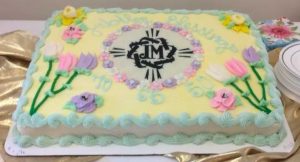
BREAKING THE SILENCE – Anti-Racism Workshop
Acting on the anti-racism commitment of the recent Province Assembly, the 8 members of the MD/DC region gathered on January 27 for a day-long workshop led by Sisters of Notre Dame de Namur Patricia Chappell and Ann-Louise Nadeau. Input, group discussions and break-out sessions all centered around the workshop theme of Breaking the Silence: Conversations About Racism, Power and Privilege. Although the three members of the Leadership Team were at the Stuart center with Srs. Patty and Anne-Louise, the gathering took place through ZOOM, with the other participants joining from home.
The presenters noted that our RJM documents echo the LCWR focus on recognizing racism as a system that promotes injustice and acting to dismantle it. Taking a cue from the assembly commitment to “recognition of our own complicity in perpetuating this injustice,” Patty and Ann-Louise framed the workshop to facilitate our taking a critical and clear-eyed look at the manifestations of that complicity in RJM decisions and structures.
Why So Difficult?
What aided greatly in helping participants to do this was time spent addressing the question: Why is talking about racism so difficult? The two sisters modeled a conversation on this for us, speaking from each one’s self-identification as a black or white woman. In small break-out groups, RJM’s addressed the same question with one another.
The Pervasiveness and Impact of Racism
Information about the nature, history and extent of racism in USA paved the way for facing the difficult question: How has racism impacted your religious congregation? Participants first took this up in break-out groups, then in full group discussion, looking at how white privilege, acceptance of Euro-centric whiteness as normative and other manifestations of racism are present in our RJM history and structures.
A Way Forward
The final input of the day was an overview of those values that have helped to keep racism alive and well, and a presentation of alternatives that are conducive to anti-racist thinking. These include “both/and” thinking; an “abundance” world view that looks to share resources and power; transparent communication that leads to consensus decision-making; and relationships marked by cooperation and collaboration.






